Workshop “Experience of application of active teaching methods in the educational process”
On December this year a workshop “The experience of active teaching methods in the educational process” was held at the department of pharmaceutical and toxicological chemistry. The program of the workshop included:
· laboratory classes by toxicological chemistry using the method of PBL (in Kazakh language);
· laboratory classes by pharmaceutical chemistry with PBL and TBL (in Russian);
· SIWT by medicinal chemistry with TBL (in Russian);
· laboratory classes by chemistry and technology of synthetic drugs by the method of TBL (in Kazakh language);
· SIWT by Standardization and Metrology of drugs using the methods of PBL and TBL (in English).
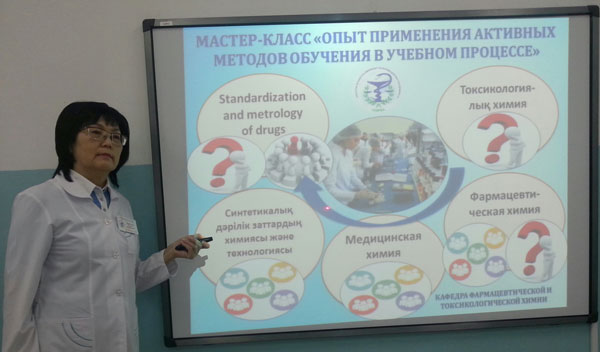
The head of department, professor S.K. Ordabayeva acquainted the audience with the program of the workshop, which was consistent, that is, the continuity of basic and specialized disciplines together, which included both mandatory and elective components. She also highlighted the main purpose of active learning methods (AML), their merits and relevance in modern education.
During the sessions guidelines for the usage of CBL (PBL) and TBL of L.K. Sarsenova (Almaty, 2014) were used.
The case-study was submitted on toxicological teacher from real life forensics.
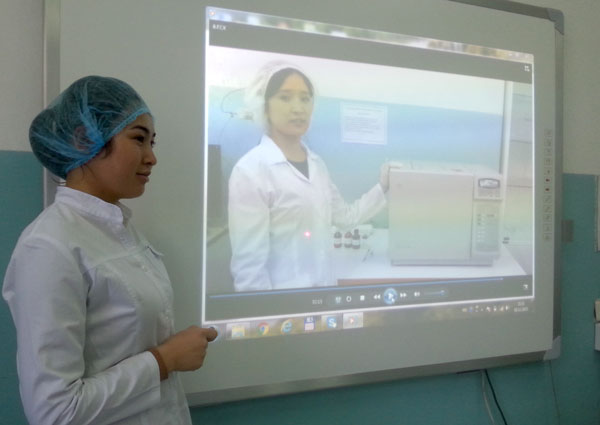
In this case, the group worked on a specific problem, which enabled the group to develop a strategy to deepen into the problem, step by step to carry out the laboratory part of the task, increasing creativity and performance of each student.
Students in the performance of laboratory class showed professional skills working in a chemical laboratory, master of techniques and methods of chemical and toxicological analysis. The results of the analysis of the situation students reported to the group, concluded on sample preparation methods to identify and quantify the potent substance that was used by the victims, along with alcohol.
At the class of pharmaceutical chemistry in order to carry out the training by the “case studies” it was announced by the “real” situation: admission to the authorized body “yellow cards” of health facilities with complaints of lack of efficacy and side effects of the dosage form of the study drug. To determine the cause of this problem, the competent authority decided to conduct an additional examination of the preparation for compliance with the requirements of normative document.
To address the specific situation, students played the role of analytical chemist in the testing laboratory for quality control of medicines. To this end, each study group was divided into two teams (small groups). Each small group chose its leader – “speaker” of the group. After receiving the task of each teacher a small group performed pharmacopoeia analysis substance and tablets of the drug under sections of the normative document.
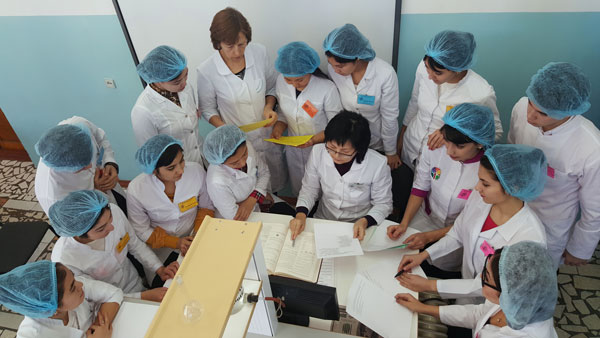
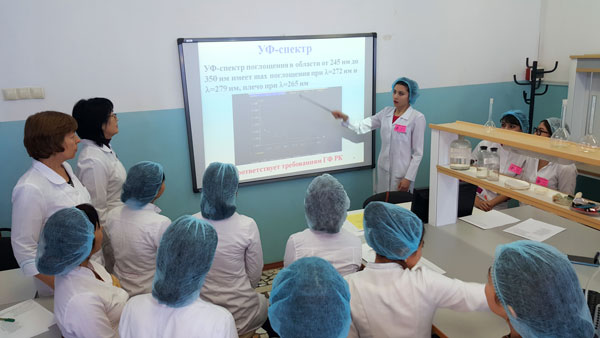
Small groups discussed possible causes of discrepancies on the cards in the game. Each group made its proposals and algorithm for solving the problem of a possible way out of the situation.
The next phase of the master class of medicinal chemistry performed in SIWT using active learning methods - TBL. Students of the first small group made a presentation on the topic, where they underlined the importance of preclinical and clinical studies to create drugs. Students revealed the urgency of the subject, outlined the modern methods of creating new drugs and concepts about the relationship structure - pharmacological effects of drugs. The presentation was made on the requirements set out in the guidelines for SIWT.
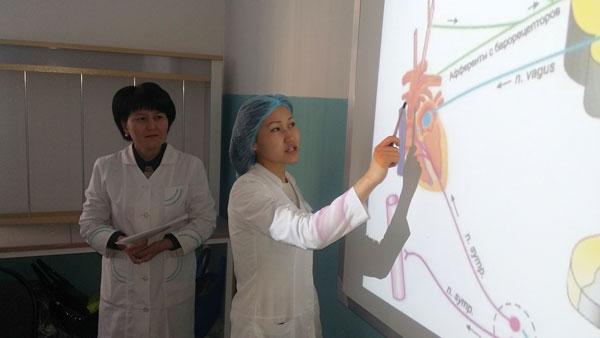
After the presentations the second small group acting as reviewers asked interested questions to the presenters. The reviewers evaluated the presentation of information on the content, design, slide design, background, volume of information text. They made a report and put forward its assessment presented to the presentation of the criteria set out in the guidelines for the SIWT.
Laboratory lesson in chemistry and technology of synthetic drugs was also carried out using the command method - TBL. Students were divided into three small groups.
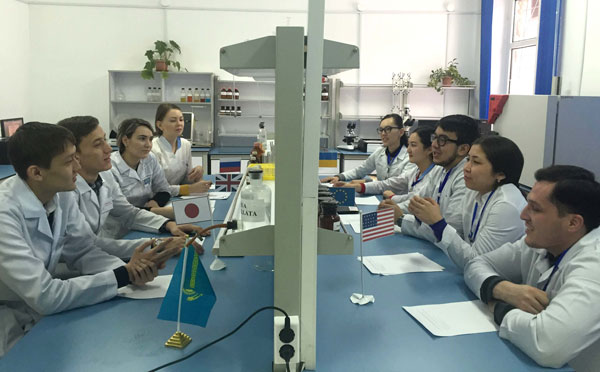
The first team worked on the theoretical problems of laboratory and industrial synthesis process, the second - on the synthesis of the drug in the laboratory and purification of the resulting product, the third - to conduct calculations of balance of material synthesis, confirmed the authenticity of the product obtained. The results of the team defending in presentation form.
SIWT classes of Standardization of drugs and metrology conducted using two methods of active learning - case-study and discussions. According to the guidelines, a type of discussion is the “meeting of the expert group”. For the examination, discussion and decision on the three issues of the practice of pharmaceutical activities of the expert group consisted of representatives of the international pharmacopoeia committees (Kazakhstan, Russia, Ukraine, USA, Great Britain, EEC and Japan).
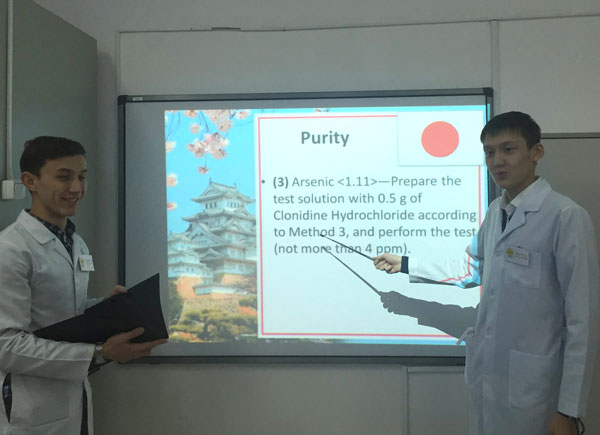
The speaker of the meeting told about three case-studies that should have been solved by experts.
In discussing the problems experts focused on such issues as: the absence of the desired effect and serious side effects of the drug, the reasons for non-compliance in terms of “transparency of the solution”, “related substances”, “content uniformity” and “dissolution”, etc. It was noted that the test is “dissolution’ is today an important indicator of efficiency, safety and quality of medicines.
As a result, at a meeting of the expert committee it was adopted algorithm for solving case studies and recommendations for overcoming these problems.
The discussion was held in a positive way, where representatives noted the advantages and disadvantages pharmacopoeia articles. During the discussion, students actively discussed arising problems, showing a high professional level of English with an excellent knowledge of the subject.
Evaluation of knowledge, practical skills was conducted in accordance with the criteria developed in the department for the AML, as well as recommendations for innovative teaching methods in universities (Koikov V.V., 2014).
In each session it was feedback from students who participated in a workshop, as well as with employers and faculty.
During the feedback the students described the positive aspects of innovative teaching methods, namely communication in the form of a dialogue, the solution of real situations, when decisions which they feel as a chemist toxicologist, analytical chemist, synthetic chemist and expert in the field creating normative document. Each of them at a higher level of professional competence consolidated and expanded communication skills.
Students also noted that as a result, instead of superficial and rote memorization of information they received meaningful and deep understanding of the material being studied. In this case also it is practical significance. These forms of education without requiring additional hardware contribute to a better development of the material and the development of analytical thinking and professional competency.
Invited practitioners of JSC «Santo Member of Polpharma group», NCDE and the Centre of Forensic Medicine stated that using active learning, its forms, methods and tools can be effectively solved a number of problems, which are difficult to achieve in traditional training: not only informative, but also professional motives and interests are forming. Our students have a holistic view of the professional activity, possess the skills of practical work, they formed the social skills of interaction and communication in the team and responsible attitude to work.
 986 views
986 views
